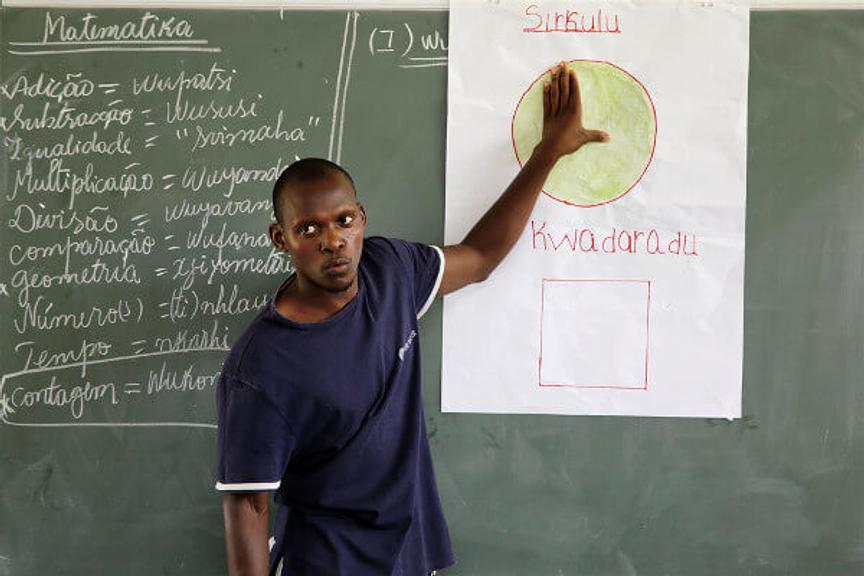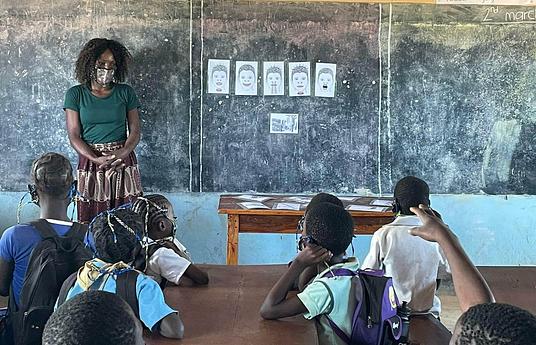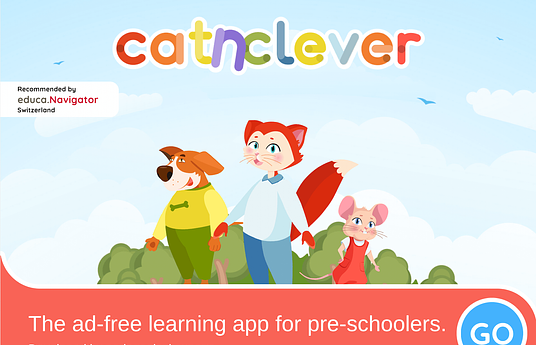Reinforcement of Reading and Writing, the literacy component of the Food for Knowledge Project (FFK), is being implemented by Planet Aid and ADPP Mozambique, in partnership with the Mozambican Ministry of Education and Human Development, and financed by USDA.
The Mozambican population is characterized linguistically by the predominant use of local languages. Mozambican Bantu languages are the mother languages of 80 percent of the country’s population. This calls for the implementation of FFK’s literacy program in these local languages.
Teaching in mother languages has proved very successful. In fact, the Government of Mozambique's educational plan is a progressive, gradual implementation of teaching in local languages. Planet Aid and ADPP Mozambique’s efforts are geared toward supporting the Government in achieving this objective, and thereby fighting illiteracy in Mozambique.
In 2017, Planet Aid and ADPP Mozambique were supporting teaching in two local languages (Changana and Rhonga) in four districts of the Maputo province, covering a total of 1979 students at 63 schools. At the same time, literacy concepts used in this program were also introduced in monolingual classes at the program’s other beneficiary schools to reinforce the teaching of Portuguese. For 2018, the target for grade-one students learning with bilingual education is 5,000.
The focus on literacy intervention is due to an understanding that the mastery of reading and writing serves as a bridge to accessing other areas of knowledge, which will permit students to participate actively and conscientiously in various spheres of social and economic life. And, by supporting strong literacy in the first grades of primary education, the project enables students to build a solid foundation of reading and writing skills at the beginning of their educational path.
To achieve these objectives, the following activities were carried out:
Training education professionals from the project’s beneficiary districts. Trainings were focused on methodologies and strategies that contribute to continuous improvement of the teaching and learning process in the first three grades. In 2017, 119 teachers and 197 pedagogical directors and representatives from district’s education department received training.
Production of materials in partnership with the Ministry of Education and Cambridge Education. Four reading books for first and second grade (including respective manuals with methodological suggestions for teachers), 30 read-aloud books, and 36 decodable books were produced in Xichangana and Xirhonga. These serve to develop a student’s skill in reading and writing, as well as improve his or her attention, active listening, comprehension, speaking skills, and vocabulary.
The production of Changana second grade books has resulted in an agreement to produce, not only reinforcement materials for reading and writing (as it was the case for grade one books), but also the second-grade student book. Along with use in FFK beneficiary schools, this book will be used in other Maputo Province schools. There is also the prospect of extending the use of this material to other schools where the Changana language is spoken.
Introduction of a coaching system to offer support in organizing, planning, and pedagogy for school leadership and all first through third grade teachers. The Reading Coach supports the teacher directly and permanently, by assisting in joint planning, production, the use of didactic material, the correct use and conservation of reading and writing reinforcement materials, ornamenting the classrooms, and organizing the students. The Reading Coach also contributes to perfecting methodological strategies, observes the classes, and ensures that the education programs are fulfilled.
The Reading Coach influences the correct functioning and organization of the school. This allows for the sharing of methodological strategies among teachers of grades one to three, and among teachers from higher grades. In general, this improves the quality of teaching and contributes to good in-service training for the teachers. By providing this type of support, the project ensures the continuation of effective educational processes, including the organization, management, and operation of schools, and the improved quality of education, even after the project ends.
An evaluation of the first year of implementation of the literacy component was carried out in 2017. From this evaluation, some important gains can be registered. These include:
Communities are better able to understand the importance of bilingual education for efficient learning and for maintaining the value of the local languages and cultures.
Strengthening of partnerships between ADPP Mozambique, Mozambique’s Ministry of Education, the district-level governments and education departments, and the local communities.
The plan for production, printing, and allocation of materials was successfully carried out.
Betterment of methods for teachers in beneficiary schools, resulting in a substantial increase in the quality of students’ learning.
Planet Aid and ADPP Mozambique are committed to this literacy project and to ensuring the continuation of collaboration with the Mozambican Ministry of Education institutions at the central, provincial, district, and local levels.



